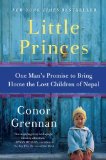Summary | Excerpt | Reading Guide | Reviews | Beyond the Book | Readalikes | Genres & Themes | Author Bio

One Man's Promise to Bring Home the Lost Children of Nepal
by Conor Grennan
I hadn't realized until that moment how much I did not want to walk through that gate. What I wanted was to tell people I had volunteered in an orphanage. Now that I was actually here, the whole idea of my volunteering in this country seemed ludicrous. This had not been lost on my friends back home, a number of whom had gently suggested that caring for orphans might not be exactly what God had in mind for me. They were right, of course. I stood there and tried to come up with even a single skill that I possessed that would be applicable to working with kids, other than the ability to pick up objects from the floor. I couldn't recall ever spending time around kids, let alone looking after them.
I took a deep breath and pushed open the gate, wondering what I was supposed to do once I was inside.
As it turns out, wondering what you're supposed to do in an orphanage is like wondering what you're supposed to do at the running of the bulls in Spain - you work it out pretty quickly. I carefully closed the gate behind me, turned, and stared for the first time at a sea of wide-eyed Nepali children staring right back at me. A moment passed as we stared at one another, then I opened my mouth to introduce myself.
Before I could utter a word I was set upon - charged at, leaped on, over-run - by a herd of laughing kids, like bulls in Pamplona.
The Little Princes Children's Home was a well-constructed building by Nepalese standards: it was concrete, had several rooms, an indoor toilet (huzzah!), running water - though not potable - and electricity. The house was surrounded by a six-foot-high brick wall that enclosed a small garden, maybe fifty feet long by thirty feet wide. Inside the walls, half the garden was used for planting vegetables and the other half was, at least in the dry season, a hard dirt patch where the children played marbles and other games that I would come to refer to as "rubber Band Ball Hacky Sack" and "I Kick You."
All games ceased immediately when I stepped through the gate. Soon I was lugging not only my backpack but also several small people hanging off me. Any chance of making a graceful first impression evaporated as I took slow, heavy steps toward the house. one especially small boy of about four years old hung from my neck so that his face was about three inches from my face and kept yelling "Namaste, Brother!" over and over, eyes squeezed shut to generate more decibels. In the background I saw two volunteers standing on the porch, chuckling happily as I struggled toward them.
"Hello!" cried the older one, a French woman in her late twenties who I knew to be Sandra, the founder of Little Princes. "Welcome! That boy hanging on your face is Raju."
"He's calling me 'brother.' "
"It is Nepalese custom to call men 'brother' and women 'sister.' Didn't they teach you that at the orientation?"
I had no idea if they had or not. "I should have put down my backpack before coming in," I called back, panting. "I don't know if I can make it to the house."
"Yes, they are really getting big, these children," she said thoughtfully, which was less helpful than "Children, get off the nice man." one boy was hanging by my wrist, calling up to me, "Brother, you can swing your arms, maybe?"
I collapsed onto the concrete porch with the children, which initiated a pileup. I could see only glimmers of light through various arms and legs. It was like being in a mining accident.
"Are they always this excited?" I asked when I had managed to squirm free.
"Yes, always," said Sandra. "Come inside, we're about to have daal bhat."
I went upstairs to put my stuff down in the volunteers' room, trailed by several children. We were five volunteers in total. Jenny was an American girl, a college student, who had arrived a month earlier. Chris, a German volunteer, would arrive a week later. Farid was a young French guy, thin build and my height, twenty-one years old, with long black dreadlocks. I first assumed Farid was shy, since he was not speaking much to the others, but soon realized that he was only shy about his English.
Excerpted from Little Princes by Conor Grennan. Copyright © 2011 by Conor Grennan. Excerpted by permission of William Morrow. All rights reserved. No part of this excerpt may be reproduced or reprinted without permission in writing from the publisher.
There are two kinds of light - the glow that illuminates, and the glare that obscures.
Click Here to find out who said this, as well as discovering other famous literary quotes!
Your guide toexceptional books
BookBrowse seeks out and recommends the best in contemporary fiction and nonfiction—books that not only engage and entertain but also deepen our understanding of ourselves and the world around us.